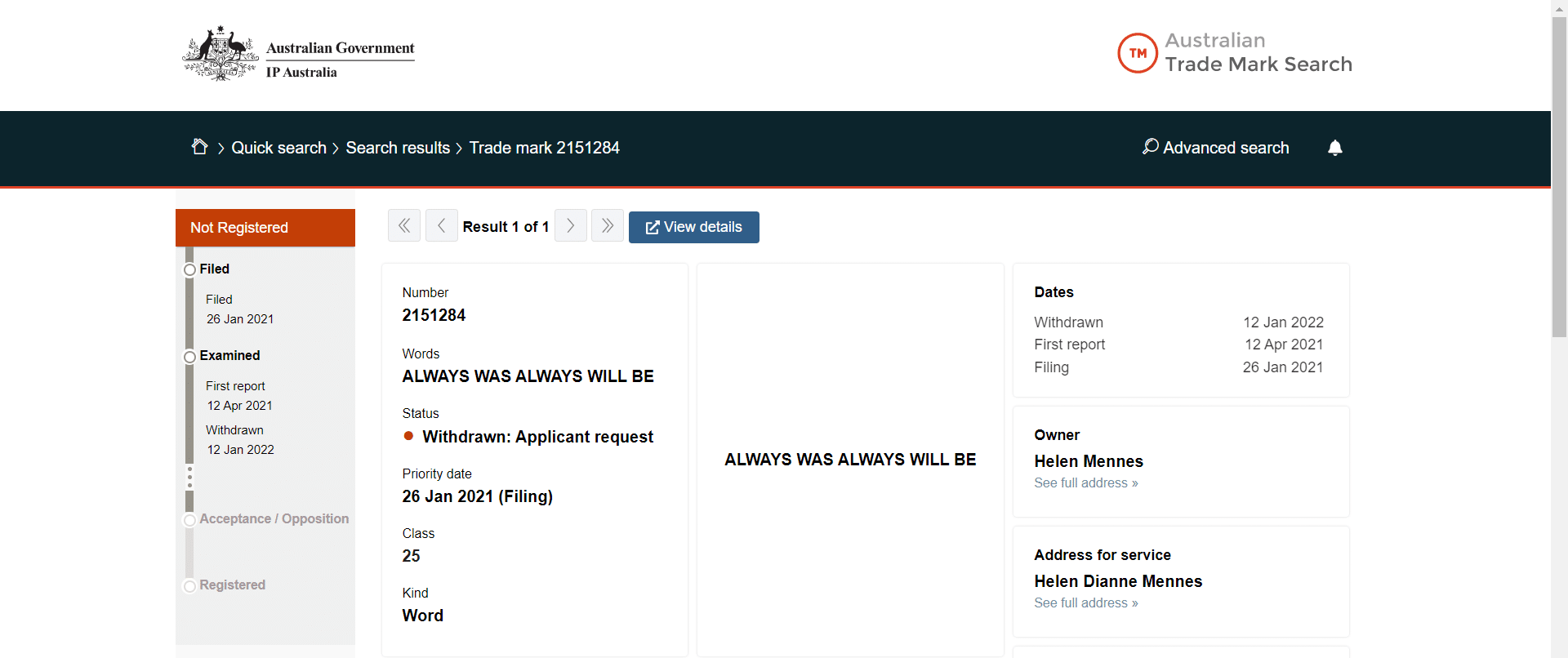Our client, Clothing the Gaps, recently posted an update on their Instagram in relation to the trade mark application. This is regarding “Always Was, Always Will Be” in class 25 (clothing, footwear, etc.) (TM Application). This can be found here.
Clothing the Gaps is an Aboriginal social enterprise fashion label. It uses its profits to support the Clothing The Gaps Foundation. This has been set up for the purpose of supporting and advocating for Indigenous health and rights. Furthermore, Clothing the Gaps sells apparel featuring the phrase “always was, always will be” and has done so for a number of years. Clothing the Gaps states that when you wear ‘Always Was Always Will Be’, you are recognising that First Nation people. People that have occupied and cared for Australia for 65,000 years.
Trade mark applications such as the above beg the questions of:
- How can individuals apply for exclusive trade mark rights to a phrase which many would argue is a phrase for collective use of Indigenous Australians?
- Will these kinds of applications be accepted by IP Australia?
- If the applications are accepted, what can be done about them?
The Application
The trade mark register is that any person can apply for any trade mark that they wish to seek. However, this thankfully does not mean that all trade marks will achieve registration!
Given the Trade Marks Act 1995 (Cth) (TM Act) grants rights to the trade mark owner to use the trade mark and prevent others from using it. There are distinct matters which examiners will consider when reviewing each application.
Essentially, this is a social exchange: a monopoly will be granted to trade mark owners. However, only if the application falls within the acceptable criteria set by the TM Act, which has been drafted to reflect the values of Australian society.
Examination of the TM Application
On 12 April 2021, the TM Application received an objection under section 41 of the TM Act. This is on the basis that the trade mark is not capable of distinguishing the goods of the applicant from the goods of other traders. This section is broad reaching and is raised where the trade mark lacks distinctiveness. Due to being descriptive or is not specific enough to the applicant based on how consumers will perceive the mark. (ie. Is it in general use such that consumers won’t perceive it as a trade mark or a trade mark which other traders should be able to use?).
Specifically, the Examiner stated that “Always Was Always Will Be” should not be registered as it is “an expression in common use by other traders which is applied to clothing, footwear and headgear to promote indigenous ownership or custodianship of land”.
Offensive TM Protections
Unlike jurisdictions such as New Zealand, Australia does not presently have specific protections in the TM Act preventing the registration of trade marks offensive to our Indigenous population. In New Zealand, section 17 of their Trade Marks Act 2002 (NZ) prevents registration of a trade mark which is offensive to a significant section of the community. This is specifically referring to the Māori community. Any trade marks which may offend the Māori community will be referred by the Examiner to the Māori Advisory Committee. In Australia, there is a general provision that prevents scandalous or unlawful trade marks. Although, there is no direct reference to Indigenous Australian values or traditions.
Section 41 is the likely objection which will be raised for these kinds of trade marks. Ones which have a social or political reference. However, that is not to say that it would be impossible to achieve registration of this kind of trade mark. If the words were put into a distinctive logo trade mark and substantial evidence of use was provided, this may be enough to overcome the objection and achieve acceptance.
Opposition
In the event that such a trade mark achieved acceptance, it would be possible to oppose the registration. This can be done by anyone with standing, the standard of which is a reasonably low bar in Australia. Basically, everyone has standing to oppose an application.
Opposition of the TM Application could be on the following grounds under the TM Act:
1. Section 57 – the application should have been rejected at the examination stage (for example, the opposing party believes that the applicant should not have overcome the section 41 distinctiveness objection);
2. Section 58 – the applicant is not the owner of the trade mark. Given they were not the first user of the trade mark in Australia on the relevant goods/services;
3. Section 60 – the trade mark is similar to an earlier trade mark which has gained a reputation in Australia. The existence and use of the two trade marks would deceive or confuse consumers; and
4. Section 62A – the trade mark application was made in bad faith.
Indigenous Initiatives
We note that IP Australia is currently working on initiatives. These are to better protect and represent Australian Aboriginal and Torres Strait Islander communities. We have previously written an article on these initiatives, available here. You can also access IP Australia’s Indigenous Knowledge work plan for 2020-2021 here.
Outcome
Pleasingly for our client and the wider Indigenous community, this application was assigned to another individual. This individual instantly withdrew the application from IP Australia. Meaning, no one individual or business holds formal trade mark ownership rights over the phrase “Always Was, Always Will be”.
We are of the opinion that it would be extremely unlikely for this kind of trade mark to be accepted by IP Australia. In the event that acceptance was provided, any person has standing to file an opposition against such registrations.
We are yet to see the development of an Australian Indigenous Advisory Council/Panel. Although, we understand that IP Australia intends to develop such a council or panel for the inclusion of Indigenous standards for intellectual property protection in Australia.
If you would like to know more about our client Clothing the Gaps, including their mission and apparel, they can be found at https://www.clothingthegaps.com.au/.
Contact for further information
For more information about trade marks, contact our IP lawyer and trade marks attorney, Maddison Reznik.

Maddison Reznik
Lawyer and Trade Mark Attorney
Maddison was admitted to the legal profession in early 2019 and commenced her career in intellectual property with FAL IP in 2020. Her interest in intellectual property law was sparked from meeting inspiring IP lawyers and judges when growing up, through the Intellectual Property Society of Australia and New Zealand (IPSANZ).

